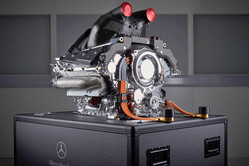


06/07/2021
NEWS STORY
 While admitting that the 2025 power unit will feature a much increased electric component, Toto Wolff explains why the sport is determined to stick with the internal combustion engine.
While admitting that the 2025 power unit will feature a much increased electric component, Toto Wolff explains why the sport is determined to stick with the internal combustion engine.
Following a meeting of the current engine manufacturers, together with Red Bull, Porsche and Audi on Saturday, F1 and the FIA issued a brief joint-statement.
"Very positive discussions took place today with all of the current and potential new power unit suppliers regarding the next phase of the Formula 1 power unit," it read.
"The discussions will continue over the coming weeks with further news to be announced following those discussions."
Speaking on the grid before Sunday's race, Stefano Domenicali confirmed that the discussions had the seen the parties take a "step forward".
While few were willing to say little more, Mercedes boss, Toto Wolff subsequently admitted that the 2025 power unit is likely to feature more an increased electric component.
"The discussion was 'what are we doing in the future in terms of engine'," he said, according to Motorsport.com, "because we want to save costs, but we don't want to reinvent the wheel.
"We also want to have an engine that is relevant from 2025 to 2030," he added, "and we can't be old petrol heads with screaming engines when everybody expects us to be going electric.
"So these engines are still going to be fuelled. We are staying with the current V6 format, but the electric component is going to massively increase."
This surely puts the sport, which boasts its green credentials at the drop of a hat, at odds with the general green consensus, for as more cities prepare to ban the internal combustion engine, F1 intends to stick with it for a little longer... albeit with sustainable fuels.
"Why we are staying with the internal combustion engine is that we believe that the fuel is going to be with us for a long time," explained Wolff.
"In Europe we may have the ambitious targets of having electrical mobility as part of our daily life by 2030, and I can see at Mercedes how ambitious the targets are, but in the rest of the world, we will have millions of vehicles that would still run on fuel.
"For Mercedes cars itself we believe that we will have several million vehicles in the world that will still run on fuels. So, what we can contribute with our innovation is to help them to develop sustainable fuels: be it biofuels or synthetic fuels.
"Our cars will run on 100 percent sustainable fuels by 2025, and this is how we will contribute to the reduction to the world's CO2 emissions."